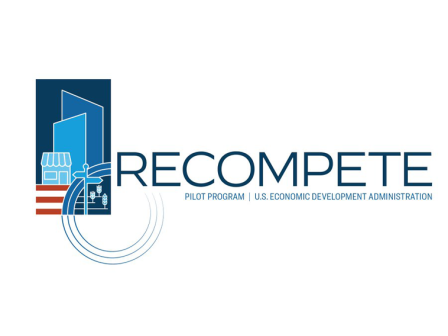
EDA’s Recompete Program Provides the Impact Communities Need Most
"A job's about a lot more than a paycheck, for real. It's about a lot more than a paycheck. It's about your dignity. It's about respect. It's about being able to look your kid in the eye and say it's going to be okay. And mean it when you say it."
President Joe Biden
In August 2024, EDA announced $184 million in grants for six awardees of the Distressed Area Recompete Pilot Program (Recompete). This announcement marked the culmination of the two-phase competition, which saw unprecedented interest in this much-anticipated jobs program.
Recompete was enacted as part of the CHIPS and Science Act, a key part of the Biden-Harris Administration’s economic agenda. Congress appropriated $200 million for Recompete with a clear mandate to EDA: build a new, innovative grant competition specifically targeted to deeply distressed communities. We took this mandate seriously and worked to put the needs of distressed communities at the forefront of every program design decision—from policy objectives to coaching and evaluation. While we are still observing the outcomes of these decisions, we hope this update serves as a candid reflection along the way.
At its core, Recompete is designed to make high impact investments to improve prime-age (25-54 years old) employment in distressed communities. To achieve this, we allowed for a wide range of fundable activities so that each strategy reflected local needs, avoiding a “one size fits all” approach (read about each community’s Recompete Plan here). We also recognized that, to address deep economic distress, applicants needed to bring forward bold visions that would require significant funding. Applicants were encouraged to submit multiple projects as one package (e.g., project #1 for workforce training, project #2 for small business growth, project #3 for wraparound supports), which could total approximately $20 to 50 million for each community.
Together, these two design decisions encouraged communities to request funding that would typically need to be divided across different agencies, funding opportunities, or rules. Ultimately, our goal was to help applicants avoid piecemeal fundraising and implementation efforts, which often come at an outsized cost to distressed places.
In addition, while many federal programs require applicants to bring a percentage of “matching” funds, Recompete eliminated this requirement, allowing applicants to involve new, hard-to-reach partners in the most distressed places. Instead, the program’s second phase encouraged the 22 finalists to secure “community commitments” from local partners, which included cash, leveraged public investment, local or state-level policy changes, and other forms of support.
By broadening program requirements beyond a specific match threshold and encouraging communities to compete with self-identified commitments, the competition lowered its barrier to entry and generated significant levels of co-investment.
Finally, while large-scale competitions can serve as an effective tool for funders to identify the highest quality proposals, we recognize that participation can also be taxing for distressed places. To mitigate this, we rolled out the competition in two phases; this allowed us to both simplify the Phase 1 application, as well as provide robust, hands-on technical assistance in Phase 2 to a smaller cohort of 22 Finalists. We received 565 applications when the program launched, the highest number of any of EDA’s national competitions in history – and half of these applicants had never applied for an EDA grant before.
Authorized as a program exclusively focused on distressed communities, the scope and scale of demand for a program like Recompete was evident, and so was the need for a refresh in its approach to grantmaking. Building on EDA’s nearly 60-year history of supporting economic development across the country, Recompete’s launch allowed us to pilot new design features to continue to break down barriers that economically distressed places face.
Read more about the Recompete Pilot Program at eda.gov/recompete.
